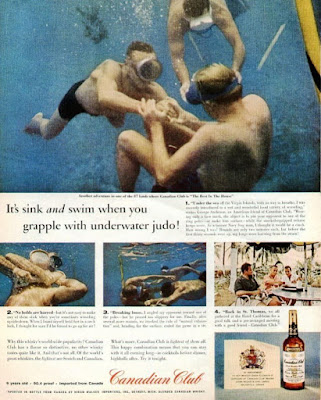As a youngster in the 1960s, the only “grown-up” reading material around the house (other than the evening newspaper which I delivered for many years) was my mom’s subscription to “Redbook” and my dad’s subscription to “Newsweek.” Turning the pages of the latter, must have been where I first encountered the liquor advertisements about hiding a case of Canadian Club Whiskey in a remote locations around the world including the Great Barrier Reef and then challenging readers to seek it out. A unique kind of treasure hunt! The campaign forever fused “Canadian Club” and “adventure” in my young mind, although I have never consumed the product. According to a recent article in the Daily Mail, several cases have yet to be discovered. This campaign reminds me of the geocaching craze that swept the country in the late 1990ss and early 2000s with the advent of portable and affordable global positioning system units.
About a decade prior to the “hide a case”
campaign, Canadian Club had other advertisements that none-the-less sought to link the whiskey with adventure. One of these ads highlighted doing underwater
judo in the Virgin Islands, circa 1960.
 |
| Early 1960s Canadian Club Advertisement |
1. “Under the sea off the Virgin Islands, with no way to breathe, I was recently introduced to a wet and wonderful local variety of wrestling,” writes George Atcheson, an American friend of Canadian Club. “Wearing only a face mask, the object is to pin your opponent to one of the ring poles—or make him surface—while the snorkel equipped referee keeps score. As a former Navy from man, I thought it would be a cinch. How wrong I was! Rounds were only two minutes each, but before the first thirty seconds were up, my lungs were bursting from the strain.”
2. “No holds are barred—but it’s not easy to make any of them stick when you’re sometimes wrestling upside down. When I found myself in a neck lock, I thought for sure I’d be forced to go up for air.”
2. “No holds are barred—but it’s not easy to make any of them stick when you’re sometimes wrestling upside down. When I found myself in a neck lock, I thought for sure I’d be forced to go up for air.”
3. “Breaking loose, I angled my opponent toward one of the poles—but he proved too slippery for me. Finally, after several more rounds, we invoked the rule of “mutual exhaustion” and, heading for the surface, ended the game in a tie."
4. Back in Saint Thomas, we all gathered at the Hotel Caribbean for a good talk and a pre-arranged meeting with a good friend—Canadian Club.”
4. Back in Saint Thomas, we all gathered at the Hotel Caribbean for a good talk and a pre-arranged meeting with a good friend—Canadian Club.”

 I did actually try underwater judo of a sort, Mizu Jitsu, offered as underwater safety and self defense course designed for divemasters and lifeguards, on a trip to Honolulu in 2008. I had gone to Oahu to do some diving and compete in an ocean fin swim race at Ala Moana. I was a lifeguard instructor at the time and the advanced training offered by Mizu jitsu was something I wanted to try. Many of the techniques we practiced in Mizu jitsu were similar to the escapes practiced in lifeguard training. The pool exercise, which culminated dojo mat training, took us through a series of drills. The final encounter in the training, shown in two photos, was pretty much as described above in the Canadian Club ad, except the after-encounter beverage was a soft drink consumed pool side.
I did actually try underwater judo of a sort, Mizu Jitsu, offered as underwater safety and self defense course designed for divemasters and lifeguards, on a trip to Honolulu in 2008. I had gone to Oahu to do some diving and compete in an ocean fin swim race at Ala Moana. I was a lifeguard instructor at the time and the advanced training offered by Mizu jitsu was something I wanted to try. Many of the techniques we practiced in Mizu jitsu were similar to the escapes practiced in lifeguard training. The pool exercise, which culminated dojo mat training, took us through a series of drills. The final encounter in the training, shown in two photos, was pretty much as described above in the Canadian Club ad, except the after-encounter beverage was a soft drink consumed pool side.
Who knows when the skills come in handy. Maybe fighting off claim jumpers on my sunken treasure site as they try to steal the missing case of Canadian Club.
No comments:
Post a Comment